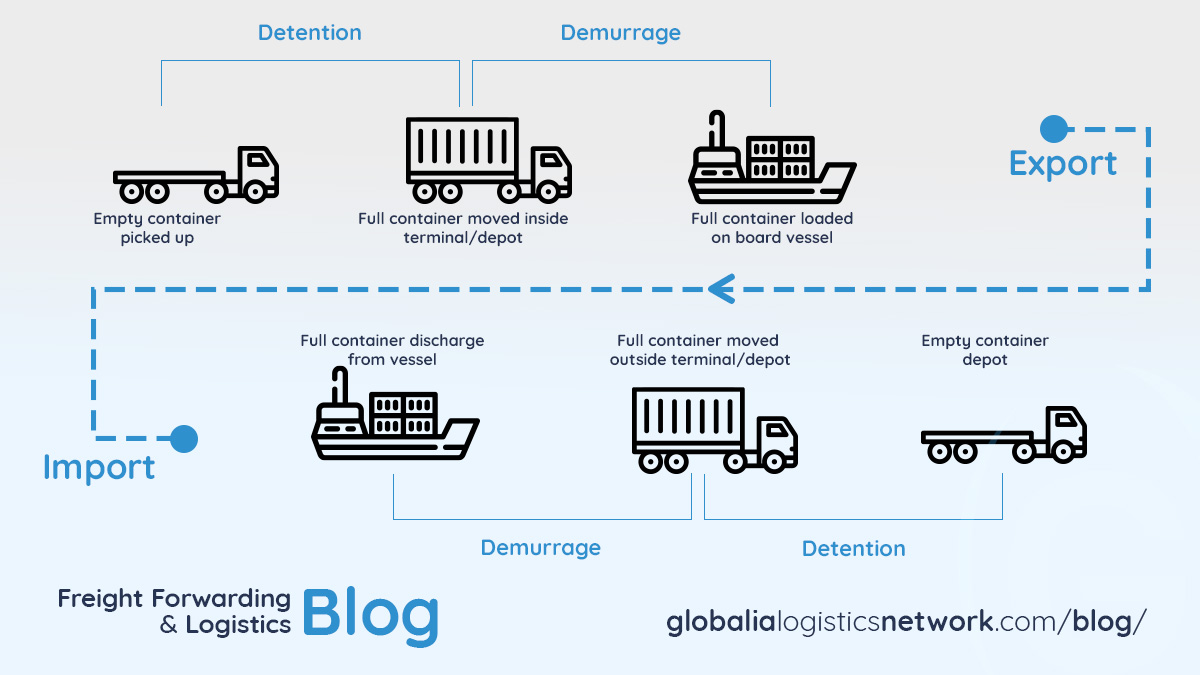In the world of ocean freight forwarding, delays can be costly—literally. Two of the most common penalties that can quickly pile up and impact both shippers and freight forwarders are demurrage and detention fees. While these charges may seem straightforward, the rules and fees surrounding them vary significantly across global ports. From Europe to Asia and the Americas, no two ports handle demurrage and detention the same way. And that lack of consistency often leads to confusion, financial losses, and strained client relationships.
In this article, we’ll demystify the complexities of demurrage and detention, explore how different regions apply these rules, and offer guidance for freight forwarders who want to minimize the risk of unnecessary fees. Whether you’re handling imports to Rotterdam, exports from Shanghai, or transshipment through Singapore, understanding local practices is vital to keeping your shipments moving—and your customers happy.
Understanding Demurrage and Detention in Ocean Freight Forwarding
Before diving into port-specific policies, it’s essential to distinguish between demurrage and detention in the context of ocean freight forwarding.

Demurrage is charged when a container stays at the terminal beyond the allotted free time, typically because it hasn’t been picked up by the consignee. Detention, on the other hand, applies when a container is out of the terminal but hasn’t been returned within the agreed timeframe. Both penalties are charged by the shipping line, but they serve different purposes and kick in at different stages of the cargo journey.
The problem? There’s no global standard. Free time periods, rates, grace days, and enforcement vary widely from port to port, and freight forwarders must navigate a maze of differing rules to stay compliant and profitable.
Why Demurrage and Detention Fees Vary So Much
One reason these charges differ is due to local port regulations and infrastructure. For example, some ports are more congested and rely on shorter free time windows to maintain container flow. Others offer extended grace periods due to greater terminal space or government-imposed standards. Additionally, global events—such as COVID-19, strikes, or trade policy shifts—can temporarily change how ports enforce demurrage and detention rules.
Furthermore, each shipping line may set its own policies based on the port, contract terms, and cargo type. This complexity makes freight forwarder demurrage management a critical skill, especially in high-volume or multimodal operations.
Comparing Demurrage and Detention Policies Across Key Global Ports
Let’s take a closer look at how these rules vary across major shipping hubs around the world:
Asia: Fast-Paced Ports, Short Free Time
Ports in Asia—like Shanghai, Shenzhen, Singapore, and Busan—are some of the busiest in the world. Due to high traffic and limited storage space, they typically allow only 3–5 days of free time for import containers before demurrage fees apply.
In Shanghai, for example, container terminals are known for strict enforcement and steep daily penalties that escalate quickly. Singapore, being a highly efficient transshipment hub, offers limited free time but provides detailed digital tools to track container status. Understanding these rules is essential for ocean freight forwarding companies operating in Asia, where delays can be both frequent and costly.
Europe: Transparent Regulations but Higher Charges
European ports such as Rotterdam, Hamburg, and Antwerp tend to offer slightly longer free periods—often up to 7 days for imports and exports. However, their demurrage and detention fees are generally higher, and some ports strictly enforce rules down to the hour.
The European Union has also introduced measures to promote transparency in demurrage billing, which benefits freight forwarders who can leverage this transparency to negotiate better contract terms. For example, at the Port of Hamburg, digital platforms allow better container tracking and help reduce the risk of unexpected demurrage.
North America: Complex and Often Disputed
The U.S. has been at the center of the global debate on demurrage and detention. Major ports like Los Angeles, Long Beach, and New York/New Jersey are notorious for congestion, and free time is often limited to 4–5 days. However, terminal inefficiencies, chassis shortages, and delays beyond the control of freight forwarders can still lead to penalties—prompting frequent disputes.
In response, the U.S. Federal Maritime Commission (FMC) has implemented policies to ensure that charges are “reasonable” and not punitive. Still, demurrage disputes in U.S. ports are common, and ocean freight forwarding firms must stay up to date on FMC rulings to protect their bottom line.
Latin America and Africa: Lack of Standardization
Many ports in Latin America and Africa, such as Santos, Durban, or Lagos, suffer from inconsistent rule enforcement, limited infrastructure, and slow customs clearance. This unpredictability can extend container dwell time, and demurrage fees often begin before the freight forwarder can complete necessary clearance procedures.
Without robust digital systems or uniform regulations, freight forwarders working in these regions must establish strong local partnerships to manage container release and returns efficiently. Demurrage and detention risk mitigation becomes a matter of planning and relationship-building, not just logistics.
The Hidden Costs of Demurrage and Detention
Beyond the direct monetary charges, demurrage and detention have ripple effects. Clients may face delayed inventory, missed deadlines, and unexpected costs—damaging your reputation as a certified ocean freight forwarder. Internally, managing these disputes wastes time and drains resources.
Moreover, failure to understand and prepare for regional demurrage policies can lead to compliance issues, particularly when dealing with hazardous materials or reefer cargo, where delays pose serious safety and legal risks.
Pro Tips for Freight Forwarders: Avoiding Penalties Across Ports
To stay ahead, ocean freight forwarding professionals must develop proactive strategies:
First, always clarify demurrage and detention terms in your contract with both the carrier and the client. Make use of digital platforms that provide real-time container tracking and alerts about free time expiration. Where possible, pre-clear cargo with customs to avoid terminal delays. Working with experienced local agents can also reduce dwell times, especially in high-risk ports.
Also, invest in logistics training for demurrage and detention compliance so your operations team can stay current with port-specific updates and new industry regulations.
Final Thoughts: Knowledge Is Power in Ocean Freight Forwarding
Demurrage and detention fees are more than a logistics nuisance—they’re a critical factor in supply chain cost control. The lack of global standardization means freight forwarders must be hyper-aware of how these policies shift between ports. The stakes are high, but with preparation, visibility, and strong carrier relationships, you can avoid penalties and deliver better value to your clients.
In the competitive world of ocean freight forwarding, mastering the art of managing demurrage and detention isn’t optional—it’s essential.


